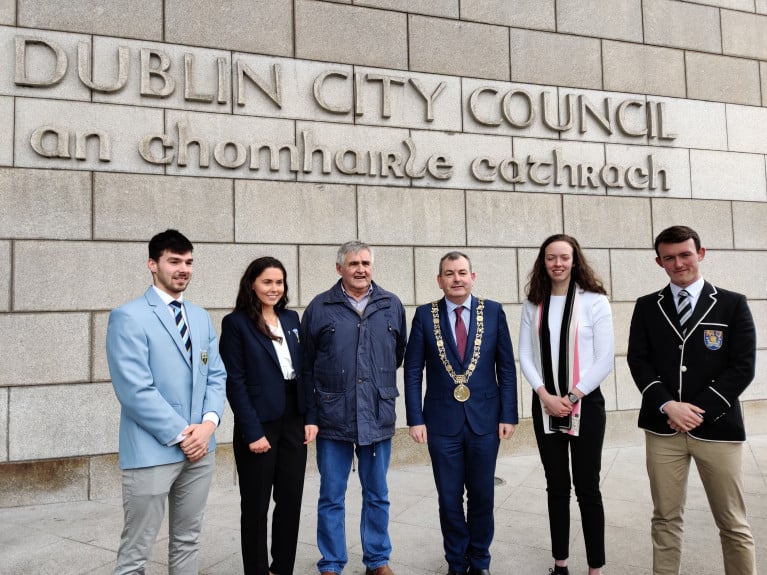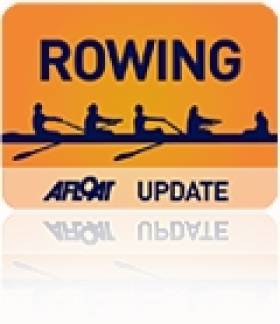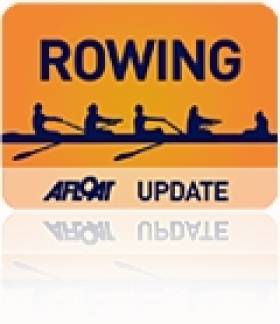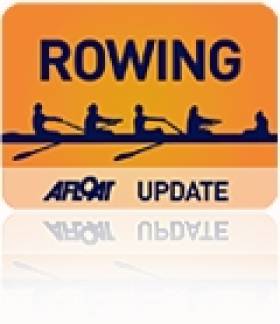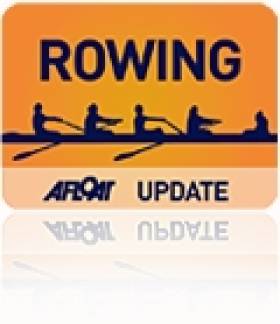Displaying items by tag: Colours
North station was the popular choice with the coin toss winners for the Dublin Colours Boat Race rowing event. Trinity won the men’s and chose it, with UCD winning the women’s.
Sean Drea was the man in charge for the coin toss at the Dublin Civic Offices at Wood Quay. The races are scheduled for Saturday week, March 14th.
#colourmatch – This Saturday, Trinity Sailing Club hosts its Colours team racing Event at a new Grand Canal Dock venue in Dublin city. All six UCD and TCD teams will compete against each other in the Dubarry of Ireland sponsored event. A flyer on the event is downloadable below. Read our Colours Match event report and photography HERE.
Traditionally this event takes place in Dun Laoghaire harbour but after the success of last year's match, which took place on the River Liffey in front of the Convention Centre, Trinity is taking the event to another new and unique location – Grand Canal Dock. Racing begins at 10a.m. sharp with a head to head, best of three matches between the corresponding teams, starting with TCD6 vs. UCD6.
In the afternoon the traditional Alumni and Ladies' races will take place before the two First teams compete for the title of winners of Colour's 2015.
All are welcome to come down and watch some competitive racing this Saturday.
Clean Sweep for Trinity over UCD on Liffey
#ROWING: Trinity won all four Colours races on the Liffey today. In the Gannon Cup for senior men, the men in black and white hoops took a small early advantage, stretched it to three-quarters of a length by Capel Street Bridge and won by one-and-a-half lengths. The two novice races were surprisingly one-sided for the Dublin University crews. The best race of the day was the women’s senior contest, for the Corcoran Cup. UCD took an early advantage and led for most of the race. But Trinity were impressively controlled in their rowing and took the lead through the last two bridges. They stretched their advantage to half a length at the finish.
Colours Races 2015, Liffey, Dublin, Saturday, March 14th.
Senior Men (Gannon Cup): Trinity (A Browne, W Doyle, J Magan, M Corcoran, P Moreau, M Kelly, L Hawkes, D Butler; cox: C Flynn) bt UCD 1½ l
Novice (Dan Quinn Shield): Trinity bt UCD, easily
Senior Women (Corcoran Cup): Trinity (G Crowe, H O’Neill, H McCarthy, S Healy, S O’Brien, A Leahy, L McHugh, R Morris; cox: N Williams) bt UCD ½ l
Novice (Sally Moorhead trophy): Trinity bt UCD easily
UCD Rowers Win Terrific Gannon Cup Race
#ROWING: UCD won the Gannon Cup for senior men after a terrific struggle, while Trinity senior women took the Corcoran Cup in facile fashion at the Colours Rowing Races on the Liffey today.
Trinity’s crew led the Gannon Cup race from just after the start, but could not gain a clearwater lead. UCD’s pushes were relentless, and though they were still behind coming through the final bridge, Watling Street, they then powered through and had command of the race when Trinity’s number four man and captain, Luke Acheson, collapsed. The race was not rowed out. It took a long time – too long - to get Acheson into an ambulance, as he had to be brought up the river all the way to City Quay before being lifted up the steps. He was being treated in St James’s Hospital this afternoon.
Trinity’s Corcoran Cup crew demonstrated that size is not everything in rowing. They were outsiders, but simply rowed better than UCD. They eked out an early lead and built it steadily into an unassailable margin by the end.
UCD’s annexation of the Sally Moorhead Trophy for novice women was also one-sided, but Trinity took the novice men’s title after UCD suffered a boat-stopping crab right in front of the Four Courts. UCD came back to lead briefly, but Trinity took control again before the finish.
Colours Rowing Races, O’Connell Bridge to St James’s Gate
Men – Senior (Gannon Cup): UCD (M Bailey, W Yeomans, C O’Riada, B Crosse, D O’Neill, A Griffin, P Moore, N Kenny (stroke); cox: L Mulvihill) bt Trinity not rowed out. Novice (Dan Quinn Shield): Trinity bt UCD 1 ½ l.
Women – Senior (Corcoran Cup): Trinity (G Crowe, H O’Neill, H McCarthy, R Deasy, S O’Brien, A Leahy, S Cass, R Morris (stroke); cox: N Williams) bt UCD easily.
Novice (Sally Moorhead Trophy): UCD bt Trinity easily.
UCD Rowers Target Seventh Consecutive Gannon Cup
The Gannon Cup Committee have announced the arrangements for the 2014 Dublin University Boat Races between Trinity College Dublin and University College Dublin. The Colours rowing races will this year take place on Sunday, March 16th, in association with the official St Patrick’s Festival. The races will be contested on the River Liffey from O’Connell Bridge to St James’ Gate Brewery. The senior men's race (The Gannon Cup) is set for 11 o'clock and the senior women's race (Corcoran Cup) 10.30. The programme will commence at 9:30am with the novice women racing for the Sally Moorhead Trophy, followed by the novice men’s race for the Dan Quinn Shield at 10am.
A winter of extreme weather conditions has led to the cancellation of the majority of Rowing Ireland events, making it hard to predict the outcome of what promises to be a very exciting series of races.
For Susannah Cass, who will row in the seven seat of Trinity's Corcoran Cup crew, this is just the first test in a summer of rowing adventures. Susannah will be racing across the Irish Sea in the Celtic Challenge race in May, before competing in the world’s first Pacific Ocean rowing race – a 2,400 mile challenge from California to Hawaii. Meanwhile, in the UCD crew, the Gilligan sisters will be hoping to keep the Corcoran Cup in the family, as Aoife enlists her sister Ruth’s help in defending the title.
The senior men's race will have its 66th staging on Sunday. The Gannon Cup was founded in 1947 in memory of former UCD captain Ciarán Gannon, who lost his life serving in the Royal Army Medical Corps in Burma in 1944. There were no races in 1957 and 1958. UCD have dominated the event in recent years and will be hoping to make this their 7th consecutive win with the help of a strong crew of promising young athletes including World Under-23 silver medallist Niall Kenny. Trinity hope the return of coach Nick Dunlop, whose record includes a number of convincing Gannon Cup wins, turns the UCD tide.
Trinity won the coin toss hosted at Leinster House by Taoiseach Enda Kenny. They chose to race on the north station in both the men’s and women’s races.
The university boat races are an annual event on the River Liffey echoing the world famous Oxford/Cambridge University Boat Race in London. In 1980 Trinity were presented with the Corcoran Cup as winners of the inaugural women’s boat race; however, UCD responded strongly to this initial defeat and currently lead the series by 21 wins to Trinity’s 13. Races for novice men and women were introduced in 2004 and 2005 respectively.
Spectator buses will follow the races and depart from the O’Connell Bridge.
Program of events:
9:30am The Moorhead Trophy – Novice Women (holder Trinity)
10:00am The Dan Quinn Perpetual Shield – Novice Men (holder UCD)
10:30am The Corcoran Cup – Senior Women (holder UCD)
11:00am The Gannon Cup – Senior Men (holder UCD)
Four In-A-Row for UCD in Gannon Cup
UCD beat Trinity by four and a half lengths in the Gannon Rowing Cup for senior men on the river Liffey in Dublin yesterday. It was their fourth consecutive Gannon and it headed up a clean sweep of colours titles in the new St Patrick’s Day slot. The Corcoran Cup for senior women was a close race, with UCD winning by three-quarters of a length, but Trinity’s novice women and novice men were well beaten.
Colours Races, River Liffey, Dublin
Gannon Cup (Senior Men): UCD (C Pierce, R Murray, S O’Neill, D Neal, F Manning, S Jacob, G Duane, P Grogan; cox: J Lynch) bt Trinity 4½l. Dan Quinn Shield (Novice): UCD bt Trinity 4l.
Corcoran Cup (Senior Women): UCD (C Tanner, K Joy, C Ni Reachtagain, A Bulman, S Bennett, A Gilligan, L Reid, B Lait; cox: C McGowan) bt Trinity ¾l. Moorhead Trophy (Novice Women): UCD bt Trinity 5l.
Click this link for the Latest Rowing News


























